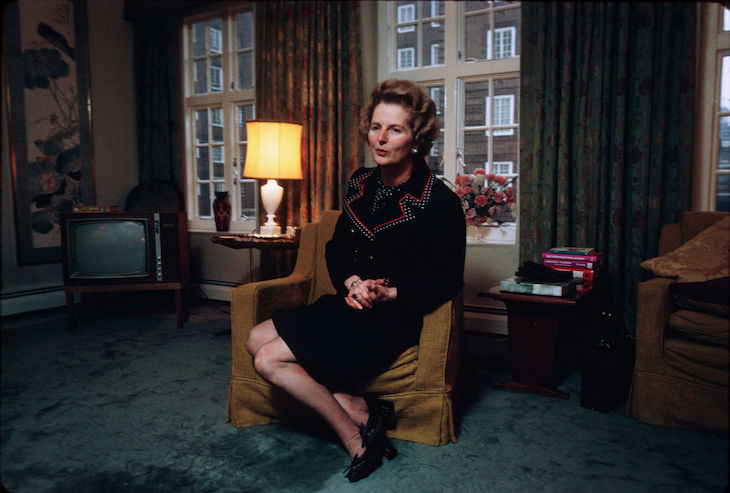When Margaret Thatcher, who was born hundred years ago today, came to visit my school I was in the midst of my stroppy-leftie phase. To my shame, I remember announcing that all Tories, let alone Thatcher – the notorious kiddies’ milk-snatcher – should be put up against a wall and shot.
When Margaret Thatcher, who was born hundred years ago today, came to visit my school I was in the midst of my stroppy-leftie phase
‘That’s not exactly civilised,’ my friend Owen Paterson, who became a Tory MP later in his life, retorted. ‘What makes you think we’re civilised?’ I said. ‘I didn’t say we are,’ said Owen. ‘But we can at least try to be.’ He had me there. I retired from the debate, silently watching the visitors’ black car crunching up the long front driveway towards us.
It was July 1973, the season of Liberal party successes in parliamentary by-elections, Roger Moore’s first quizzically raised eyebrow as James Bond, and David Bowie warbling his way through Life on Mars? on Top of the Pops. I was a 16-year-old inmate at the all-male Radley College, near Abingdon, and counting the days until the start of the summer holidays. On the last Friday of term, Margaret Thatcher, then serving as the UK’s education secretary under the increasingly beleaguered PM Ted Heath, came to visit. She was accompanied by our local MP Airey Neave, a wartime escaper from Colditz who had gone on to an enigmatic career in military intelligence before entering politics.
There may have been a flu epidemic in progress, or perhaps the school’s more politically refined students were otherwise engaged, but for some reason I was deemed fit for inclusion in the small party assembled to escort the VIPs around the premises. There must have been four or five of us in the lineup, my friend Owen among them.
Thatcher would then have been in her late forties, but looked much younger. She was dressed in a bright canary-yellow power suit of such radiance that it seemed to emerge from the car a split second before she did.
She gave us each a bony handshake, followed by a crushing one from Neave. At that we started the interminable tour of the Radley corridors, all of which smelled obscurely of boiled cabbage. Here was the school gym and there was our brand-new physics lab, and so on. Thatcher’s manner was brisk but friendly. She had that politician’s gift of recalling names, and a voice that struck me even at the time as a little unnatural in its formality. Our nation’s education minister had obviously taken elocution lessons, I remember priggishly thinking, but over and above that she was clearly a force of nature – one of those formidable English ladies of stridently given views often found on comedy shows of the era such as Fawlty Towers.
‘Do come on, Denis,’ she remarked to her husband as he showed signs of lingering at the small bar where senior members of the school were each allowed to enjoy two half-pints of beer on a Saturday night.
Keeping the ball rolling, Thatcher asked each of us what we were going to do if, and when, we went to university. Owen and I both said we were planning to read history. ‘History,’ she repeated, slowly rolling the word around her mouth as if chewing a bit of gristle. ‘I always think that history rather depends on whomever writes it.’
Seizing his opportunity, another member of our party, whom we knew by the name Latent Heat, volunteered that he was proposing to apply to the chemistry department at Oxford. ‘An excellent choice,’ our visitor beamed.
Though none of us knew it at the time, there was a special significance to that visit to Radley. According to Airey Neave’s biographer Patrick Bishop, Neave played host to the Thatchers over the ensuing weekend, and this was the very moment when he took the opportunity to encourage his guest to challenge Heath for the leadership of the Tory party. Eighteen months later, Thatcher duly did so. Neave himself was assassinated on 30 March 1979, the victim of a car bomb planted by a splinter group of the IRA that exploded as he drove away from the House of Commons, killing him just 34 days before his protégé fulfilled all his hopes for her by being elected Britain’s first female prime minister.







Comments